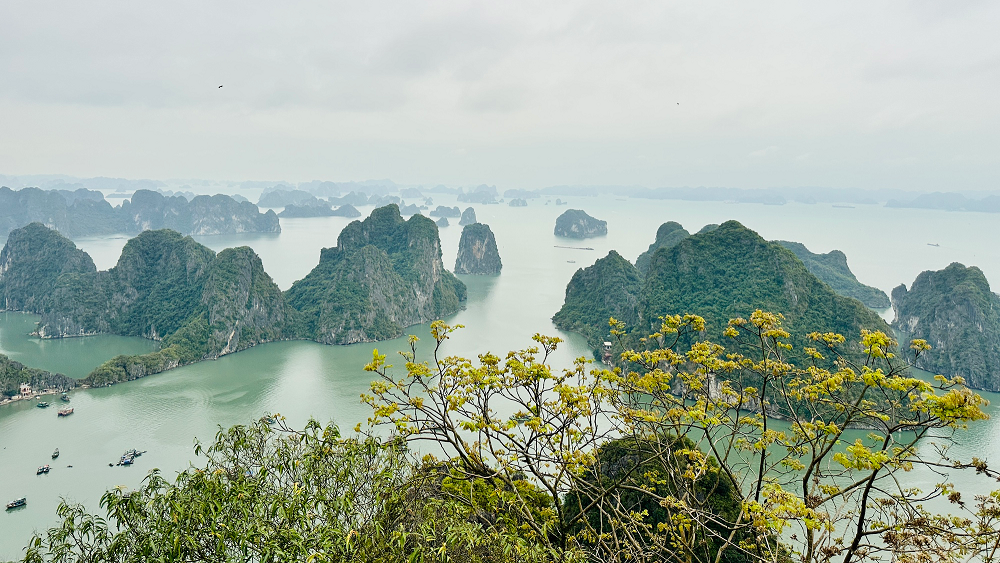Bai Tho Mountain overlooking the celebrated Ha Long Bay has been among well-known tourist attractions in the coastal city.

Standing at the confluence of land and sea, the mountain seems to be divided into two parts. Its lofty summits, with treacherous cliffs and sheer drops, loom up against the sky, the highest one resembling a majestic spear pointing at the heavens.
Like many other mountains and caves of Halong Bay, Bai Tho Mountain was formed millions of years ago, during the Devonian period. Bai Tho Mountain used to be called Truyen Dang Son, or Roi Den Mountain. The name came from its purpose during the resistance of Vietnamese against the Mongol Yuan Dynasty in 1288. On the peak of this mountain, there was an important watch-tower of the army in Northeast Vietnam. On normal days, this watch-tower was used as a lighthouse marking the direction. During the war, whenever the invaders appeared in the sea, the guards would set a fire to inform the army in the capital.
In 1468, on a spring day, King Le Thanh Tong took a journey to this area and stopped at Roi Den Mountain. The king was so impressed at the beauty of nature that he wrote a poem and made his retainers carve on the mountain cliff. Since this event, the locals changed the name of the mountain into Bai Tho, which means “poem”.

261 years later, in 1729, Lord Trinh Cuong, who was a famous poet at that time, visited this mountain. After reading the poem of Kinh Le Thanh Tong, he also wrote another one and carved it on the cliff. From that time to the early 20th century, many visitors came over this area and left their poems on the lumps of rock. Up to now, there are nine poems in total written on the cliff of Bai Tho Mountain.
Also on the top of Bai Tho Mountain, on May 1st 1930, the flag of the Vietnam Communist Party was flying as a symbol of the resilience and spirit of Vietnamese. During the resistance war against the US troops, Bai Tho Mountain played a role as a revolutionary point with an anti-aircraft guard station and an ambulance tunnel.
Through many ups and downs in Vietnamese history, although the inscriptions on the cliff might be eroded by the impacts of nature, the historical and cultural values of Bai Tho Mountain still remain the same. Nowadays, Bai Tho Mountain is one of the most well-known tourist attractions in Halong City that captures the attention of both domestic and international tourists.
Bai Tho Mountain also played a significant role during the resistance war against the U.S. troops, with an anti-aircraft guard station and an emergency basement located at the peak. Despite the potential erosion of the inscriptions due to natural influences, the historical and cultural significance of Bai Tho Mountain remains the same. It is now a popular destination for Quang Ninh tourism, attracting visitors from all over the world.
From Bai Tho Mountain, visitors can take in the picturesque and panoramic view of the ethereal Ha Long Bay. The beauty of this place is like a charming painting, with its blue water imprinted with the clouds, the green mountains gently “rising”, and the large and small boats entering and leaving the bay. Enjoying the cool breeze and fresh air here will help you cast aside all your worries and anxieties.
Ha Long authorities has currently set up a tourist route connecting Bai Tho mountain with other well-known attractions in the city such as Long Tien pagoda, Bai Tho Cultural Centre, Tran Quoc Nghien temple, the political prison, the departure house of the old ferry, Ba Deo, Hon Gai church and Ha Long I market.
Source: Quang Ninh News – english.baoquangninh.vn









